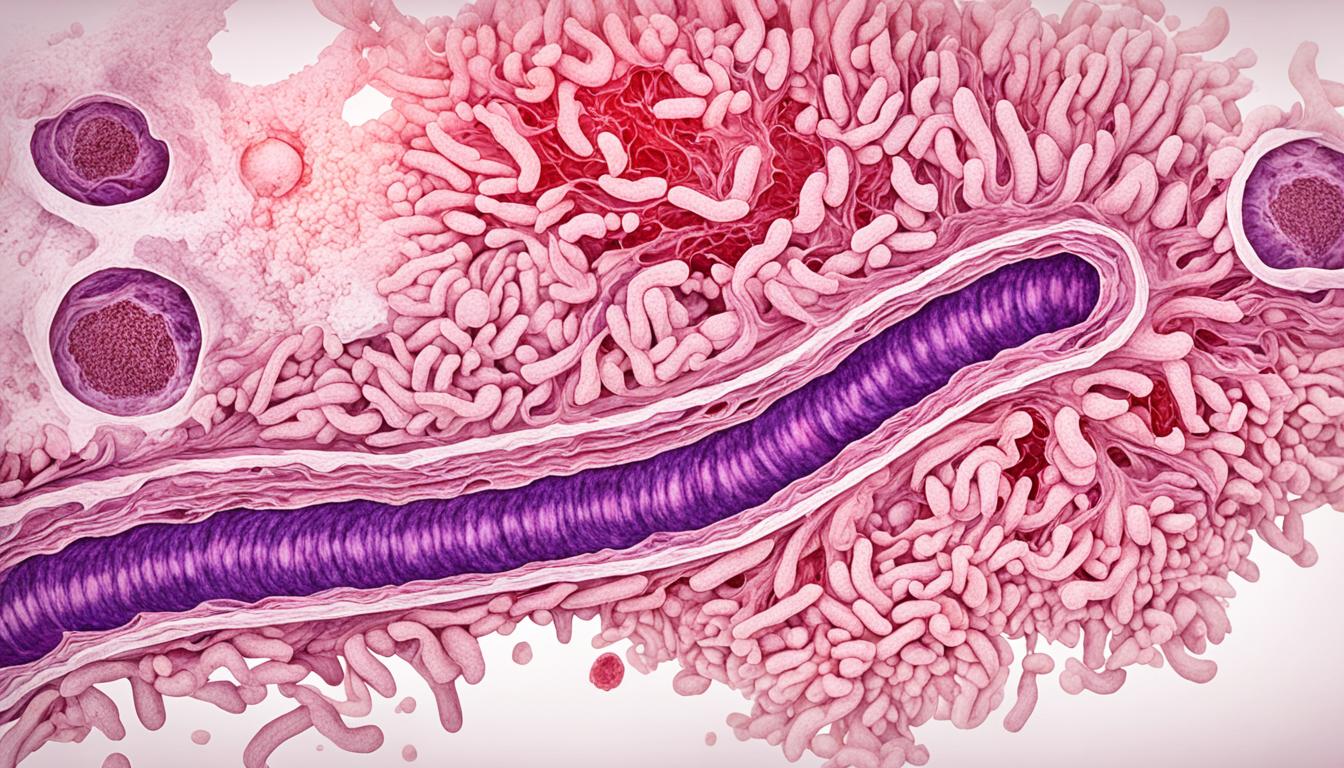Ischemic colitis causes colon inflammation and injury due to poor blood supply. This happens when blood flow to the colon drops suddenly. The main causes are blood clots, arterial blockages, and low blood pressure.
The condition’s symptoms include stomach pain, bloody diarrhea, and changes in bowel movements. It can be hard to diagnose because its symptoms are like other gut problems. Doctors need to use tests like imaging, colonoscopies, and blood tests. People who are older or have blood clotting problems are more at risk.
Doctors treat mild cases with rest and fluids. Severe cases might need surgery to remove damaged colon parts. Research is looking into new treatments, such as oxygen therapy and stem cell treatments, to help more people.
Key Takeaways:
- Ischemic colitis is a condition characterized by inflammation and injury to the colon due to inadequate blood supply.
- Contributing factors include blood clots, arterial embolisms, atherosclerosis, and low blood pressure.
- Common symptoms of ischemic colitis include abdominal pain, bloody diarrhea, and changes in bowel habits.
- Diagnosis may involve imaging studies, colonoscopy, and blood tests to differentiate ischemic colitis from other gastrointestinal conditions.
- Treatment options range from conservative measures to surgical intervention, depending on the severity of the condition.
- Ongoing research is exploring innovative therapies, such as hyperbaric oxygen therapy and stem cell-based treatments, to improve outcomes for ischemic colitis patients.
Understanding Ischemic Colitis: A Vascular Conundrum
Ischemic colitis happens when the blood supply to the colon is cut off. This usually occurs due to blood clots, blocked arteries, cholesterol buildup, or low blood pressure. A sudden drop in blood flow affects the balance of oxygen and nutrients in the colon, causing a harmful state called ischemia. If left untreated, this can lead to inflammation and injury.
The colon needs a good amount of blood to work well. It’s key for absorbing nutrients and getting rid of waste. With bad blood flow, whether from clots or other issues, the colon suffers. This leads to a lack of oxygen and nutrients, and a possible chain of inflammation and damage follows.
Ischemic colitis creates serious risks, affecting people in various ways. Unpicking its causes requires deep knowledge of how the colon and blood supply interact.
Contributing Factors
Ischemic colitis can happen due to several reasons:
- Blood clots can form and slow down blood flow to the colon.
- An embolism blocking an artery can also stop enough blood reaching the colon.
- Cholesterol buildup can narrow arteries, reducing blood flow and causing problems.
- Low blood pressure may reduce the blood getting to the colon, which is also a risk factor.
Knowing these causes helps doctors treat ischemic colitis effectively. They can offer the right care to help patients recover.
| Contributing Factors | Impact on Colon Blood Supply |
|---|---|
| Blood clots | Obstruct blood flow |
| Arterial embolisms | Block arteries, leading to insufficient blood supply |
| Atherosclerosis | Narrow blood vessels, reducing blood flow |
| Low blood pressure | Compromise blood flow to the colon |
This table highlights how each factor affects the colon’s blood supply. It also shows the common problem of ischemic colitis.
It’s crucial for healthcare experts to understand the vascular issues tied to ischemic colitis. With detailed knowledge, they can provide the best help, reducing the risks and symptoms of the disease.
Management Approaches
Dealing with ischemic colitis means looking at the cause and how to ease symptoms. Sometimes, simple methods work, like bowel rest and getting intravenous fluids for hydration and nutrition help.
For bowel rest, eating only liquids or foods with simple fibers allows the inflamed colon to heal. This reduces symptoms and risks.
Intravenous fluids ensure the body stays hydrated and keeps the right minerals. This helps because of the illness’s symptoms, like loose bowels.
Serious cases might need surgical intervention. For example, if a part of the colon is too damaged or there’s a risk of infection, removing it might be necessary.
Doctors consider many things before recommending surgery. They look at how bad the situation is, the patient’s health, and their medical history. They discuss these with the patient.
New ways to treat ischemic colitis are becoming available. Hyperbaric oxygen therapy and stem cell-based therapies are two examples.
Hyperbaric oxygen therapy exposes the patient to pure oxygen in a pressurized room. The high oxygen levels promote tissue healing and cut down inflammation by encouraging new blood vessels.
Stem cell therapies use stem cells from different sources to heal the damaged tissues. These methods aim to regenerate tissue and lower inflammation in patients with ischemic colitis.
Although these new therapies are exciting, we still need more research on how well they work and how safe they are. They’re not available everywhere yet.
To wrap up, managing ischemic colitis combines simple, surgical, and new treatment options. The best approach depends on the patient’s specific situation, discussed with a healthcare provider. Advances in medicine bring hope for better outcomes and more treatment alternatives.
Conclusion
Ischemic colitis is a serious health issue that requires a complex approach for treatment. It is crucial to act quickly because of its severe symptoms. Knowing about its causes and signs helps us protect ourselves better.
To avoid this condition, it’s vital to address risk factors. Things like staying at a healthy weight and not smoking are important. Also, managing diabetes and high blood pressure can really help. Doing regular exercise, eating lots of fiber, and staying hydrated are key to keeping the colon healthy.
Doctors are always finding new ways to treat this disease. Treatments like hyperbaric oxygen and stem cell therapy are giving hope for better results. This work on ischemic colitis not only promises better treatment but also shines a light on future medical breakthroughs

